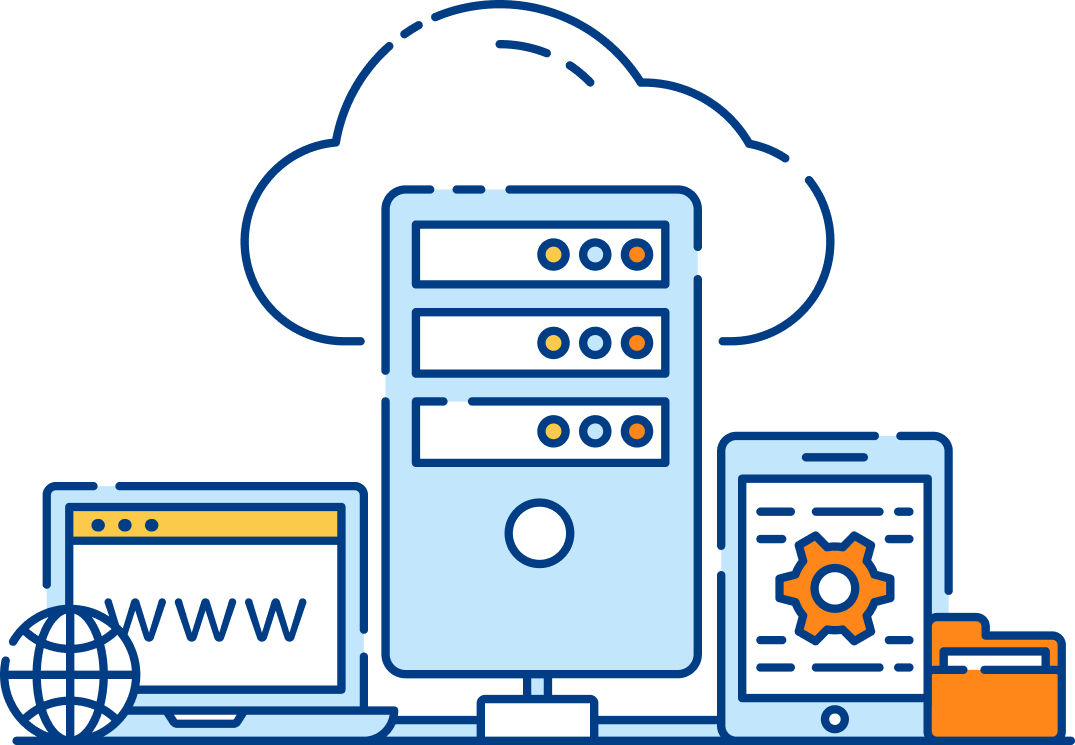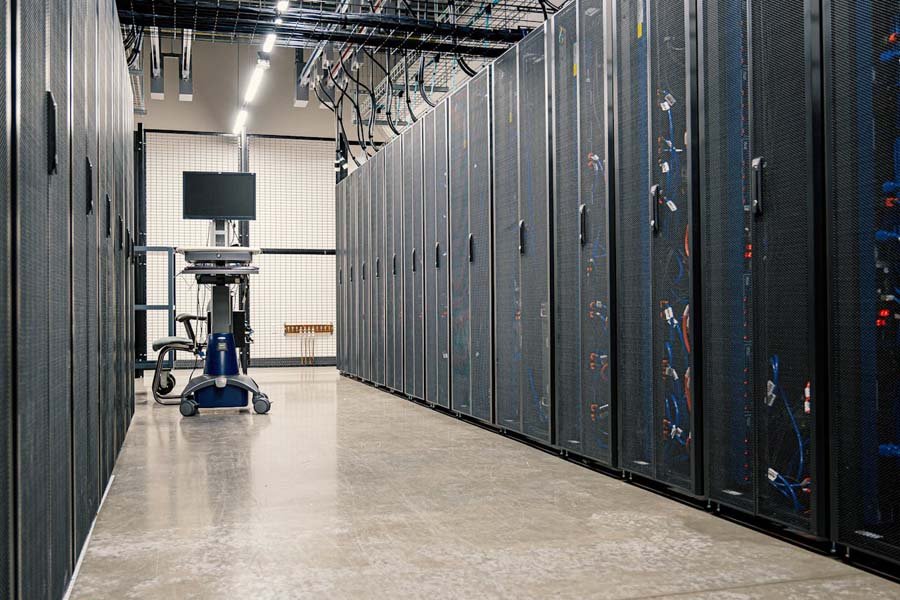Enterprise Systems
Unparalleled advantages that can significantly enhance your business operations
We provide the scalability to easily adjust your resources based on current requirements
Optimal performance and seamless integration with other cloud-based applications and services
24/7 support, proactive monitoring, and maintenance to ensure your system operates smoothly

Access Anytime, Anywhere
With Cloud ERP, your ERP system is hosted on remote servers and accessed through the internet. This means you can manage your business operations from anywhere, whether you’re in the office, working remotely, or traveling. Enjoy the flexibility and convenience of accessing your data and applications in real-time, from any device.
Scalability and Flexibility
Cloud ERP solutions offer unmatched scalability. As your business grows or undergoes changes, easily scale your resources and services to match your evolving needs. This eliminates the need for substantial upfront investments in hardware and software, allowing you to expand your system as needed with minimal disruption.
Robust Security and Compliance
Our Cloud ERP solutions are backed by advanced security protocols, including encryption, regular backups, and compliance with industry standards. Ensure your data is protected against unauthorized access and meet regulatory requirements with built-in security features.
The Best Planning, with Best Performance create the Best Results.
Alicance Data Centers – the best choice for data owners

Cloud ERP: Future-Ready and Scalable
Unlock Your Business Potential with the Right ERP Solution
In the ever-evolving business landscape, choosing the right ERP (Enterprise Resource Planning) system is crucial for operational efficiency and growth. Whether you’re considering Cloud ERP or On-Premises ERP, each offers distinct advantages tailored to different business needs. Discover which solution aligns best with your organizational goals and infrastructure.
Access Anytime, Anywhere:
With Cloud ERP, your ERP system is hosted on remote servers and accessed through the internet. This means you can manage your business operations from anywhere, whether you’re in the office, working remotely, or traveling. Enjoy the flexibility and convenience of accessing your data and applications in real-time, from any device.
Scalability and Flexibility:
Cloud ERP solutions offer unmatched scalability. As your business grows or undergoes changes, easily scale your resources and services to match your evolving needs. This eliminates the need for substantial upfront investments in hardware and software, allowing you to expand your system as needed with minimal disruption.
Cost Efficiency:
Reduce your total cost of ownership with Cloud ERP. Avoid significant capital expenditures on physical infrastructure and benefit from a subscription-based pricing model. Pay only for the resources you use and take advantage of cost-saving features like automatic updates and maintenance.
Robust Security and Compliance:
Our Cloud ERP solutions are backed by advanced security protocols, including encryption, regular backups, and compliance with industry standards. Ensure your data is protected against unauthorized access and meet regulatory requirements with built-in security features.
Automatic Updates and Support:
Stay current with the latest features and improvements with automatic updates. Our Cloud ERP services include 24/7 support, ensuring that you receive timely assistance and system management without the hassle of maintaining IT infrastructure.
Seamless Integration:
Easily integrate Cloud ERP with other cloud-based applications and services, such as CRM, BI tools, and e-commerce platforms. Enhance operational efficiency and streamline your business processes with a unified IT ecosystem.

On-Premises ERP: Control and Customization
Complete Control and Ownership:
With On-Premises ERP, your system is hosted on your own servers and managed in-house. This provides you with complete control over your ERP infrastructure, data, and customization. Tailor the system to your specific business processes and maintain direct oversight of your ERP environment.
Customization and Integration:
On-Premises ERP solutions offer extensive customization options. Design and configure the system to meet your unique business requirements and integrate seamlessly with existing legacy systems. This flexibility allows for a highly tailored ERP experience that aligns perfectly with your operational needs.
Data Security and Privacy:
Maintain full control over your data with On-Premises ERP. You manage your own security measures and infrastructure, which can be particularly advantageous for businesses with strict data privacy requirements. Implement robust internal security protocols and compliance measures tailored to your organization’s needs.
Predictable Costs:
While On-Premises ERP requires a larger initial investment, it offers predictable costs over time. With a one-time purchase of hardware and software, you avoid ongoing subscription fees and can plan your budget with certainty.
Offline Access:
On-Premises ERP systems are accessible directly through your internal network, providing reliable performance even in situations with limited or no internet connectivity. This ensures uninterrupted access to your ERP system regardless of external factors.
**6. Dedicated Support:
Benefit from dedicated support and maintenance tailored to your specific system setup. Manage upgrades, patches, and troubleshooting internally or with a trusted IT partner, ensuring that your ERP environment remains in optimal condition.
Choosing the right ERP solution depends on your business needs, budget, and operational goals. Whether you opt for Cloud ERP’s flexibility and cost efficiency or On-Premises ERP’s control and customization, both solutions offer significant advantages. Contact us today to discuss your requirements and discover how our ERP solutions can drive your business success.

frequently asked questions
When you evaluate data centers for your needs, you often have critical questions to ensure they meet your requirements. Here are six common questions we have been asked and their answers.
Cloud ERP (Enterprise Resource Planning) is a software solution hosted on remote servers and accessed via the internet. Unlike traditional On-Premises ERP systems, which are installed and maintained on your own servers, Cloud ERP is managed by a third-party provider and delivered as a service.
Key Differences:
Deployment: Cloud ERP is hosted on the provider’s infrastructure and accessed through web browsers or apps, while traditional ERP requires installation on local servers and workstations.
Cost: Cloud ERP typically operates on a subscription-based model, reducing upfront capital expenditures. Traditional ERP systems involve significant initial costs for hardware, software, and implementation.
Scalability: Cloud ERP solutions offer easy scalability, allowing you to adjust resources and features as needed. Traditional ERP systems require hardware upgrades and extensive reconfiguration for scalability.
Updates and Maintenance: Cloud ERP providers handle updates and maintenance, ensuring you always have the latest features and security patches. With traditional ERP, your IT team is responsible for managing updates and system maintenance.
Accessibility: Cloud ERP provides remote access from any location with internet connectivity, offering greater flexibility and mobility compared to traditional ERP systems that are limited to local network access.
Security: Cloud ERP providers implement robust security measures, including encryption and regular backups. Traditional ERP security is managed in-house, which may vary based on your organization’s capabilities.
Data security is a top priority for Cloud ERP providers, and several measures are implemented to ensure the protection of your sensitive information:
Encryption: Data is encrypted both in transit and at rest, ensuring that unauthorized individuals cannot access or decipher your information. This includes using secure protocols like HTTPS for data transmission and encryption algorithms for stored data.
Access Controls: Strong access control mechanisms are in place, including multi-factor authentication (MFA) and role-based access controls. This ensures that only authorized personnel can access specific data and functionalities based on their roles.
Regular Backups: Cloud ERP providers perform regular data backups to protect against data loss. These backups are stored in geographically dispersed locations, enhancing disaster recovery capabilities and ensuring data availability in case of system failures.
Compliance: Cloud ERP providers often comply with industry standards and regulations such as GDPR, HIPAA, and ISO 27001. Compliance ensures that your data handling practices meet legal and regulatory requirements.
Security Audits: Regular security audits and vulnerability assessments are conducted to identify and address potential security gaps. Providers also implement intrusion detection systems to monitor and respond to any suspicious activities.
Data Center Security: The physical data centers housing Cloud ERP infrastructure are equipped with stringent security measures, including surveillance, restricted access, and environmental controls to protect against physical threats.
Cloud ERP enhances business efficiency through several key features:
Centralized Data Management: Cloud ERP consolidates data from various business functions into a single platform. This centralized approach eliminates data silos, ensuring accurate and real-time information is available across departments.
Automation of Processes: Cloud ERP automates routine tasks such as invoicing, inventory management, and payroll processing. Automation reduces manual effort, minimizes errors, and speeds up business processes, leading to increased productivity.
Real-Time Insights: Cloud ERP provides real-time access to critical business metrics and reports. This enables informed decision-making based on up-to-date information, enhancing strategic planning and operational efficiency.
Integration Capabilities: Cloud ERP integrates seamlessly with other cloud-based applications and services, such as CRM, e-commerce platforms, and BI tools. This integration streamlines workflows, reduces data entry duplication, and enhances overall operational efficiency.
Scalability: Cloud ERP systems can be easily scaled to accommodate business growth or changing needs. This flexibility allows you to add or remove features and resources without disrupting ongoing operations.
Remote Access: With Cloud ERP, employees can access the system from anywhere with an internet connection. This accessibility supports remote work, improves collaboration, and ensures that business operations continue uninterrupted.
Cost considerations for Cloud ERP include:
Subscription Fees: Cloud ERP typically operates on a subscription-based pricing model, where you pay a recurring fee based on the number of users, features, and resources. This model converts capital expenditures into manageable operational expenses.
Implementation Costs: Initial setup costs for Cloud ERP may include data migration, system configuration, and training. However, these costs are generally lower compared to the upfront investments required for On-Premises ERP systems.
Maintenance and Updates: Cloud ERP providers handle system maintenance, updates, and security, reducing the need for in-house IT resources and associated costs. This ensures that you always have access to the latest features and security patches without additional expenses.
Scalability Costs: As your business grows, you can scale your Cloud ERP resources and features accordingly. While scaling up may increase your subscription fees, it avoids the need for significant investments in additional hardware or software.
Hidden Costs: Be aware of potential hidden costs, such as data transfer fees, integration with other systems, or additional storage requirements. Carefully review the pricing model and contract terms to understand all possible costs.
Overall Cost Efficiency: Cloud ERP generally offers cost efficiency compared to On-Premises ERP due to lower initial investments, reduced IT maintenance costs, and flexible subscription options.
Cloud ERP solutions are designed to integrate seamlessly with other applications and services to streamline business processes:
API Integration: Cloud ERP systems provide Application Programming Interfaces (APIs) that enable integration with third-party applications, such as CRM, BI tools, and e-commerce platforms. APIs facilitate data exchange and ensure that information flows smoothly between systems.
Pre-Built Connectors: Many Cloud ERP providers offer pre-built connectors and integration solutions for popular business applications. These connectors simplify the integration process and reduce the time and effort required to connect different systems.
Data Synchronization: Cloud ERP systems support data synchronization with other applications to ensure that information is consistent across platforms. This reduces data duplication and ensures that all systems are updated with the latest data.
Integration Platforms: Integration platforms as a service (iPaaS) can be used to manage and automate integrations between Cloud ERP and other applications. These platforms provide tools for designing, deploying, and monitoring integrations, enhancing overall connectivity.
Customization Options: Cloud ERP solutions often allow for custom integrations based on specific business needs. You can work with the ERP provider or a third-party developer to create tailored integration solutions that align with your unique requirements.
Support and Documentation: Cloud ERP providers typically offer support and documentation for integration efforts. This includes technical resources, implementation guides, and customer support to assist with integration challenges.
Support services for Cloud ERP include:
24/7 Customer Support: Cloud ERP providers offer round-the-clock customer support to address any issues or questions. This ensures that assistance is available whenever needed, regardless of time zones.
Onboarding and Training: Providers often offer onboarding services and training to help you get started with your Cloud ERP system. This includes user training, system configuration, and best practices to ensure a smooth transition and effective utilization of the system.
Technical Support: Dedicated technical support is available to resolve system-related issues, including troubleshooting, bug fixes, and performance optimization. This support ensures that any technical problems are addressed promptly.
Regular Updates: Cloud ERP solutions include automatic updates and maintenance, ensuring that your system is always running the latest version with new features and security enhancements. Support teams manage these updates to minimize disruptions.
Knowledge Base and Documentation: Providers offer extensive knowledge bases and documentation, including user manuals, FAQs, and online resources. These materials help users understand system functionality and address common questions independently.
Customization and Integration Support: Assistance is available for customizing the ERP system and integrating it with other applications. This support ensures that the system meets your specific business needs and integrates seamlessly with existing tools.
Performance Monitoring: Cloud ERP providers monitor system performance to ensure optimal operation. This includes proactive monitoring of system health, usage, and security, with alerts and actions taken to address any performance issues.


